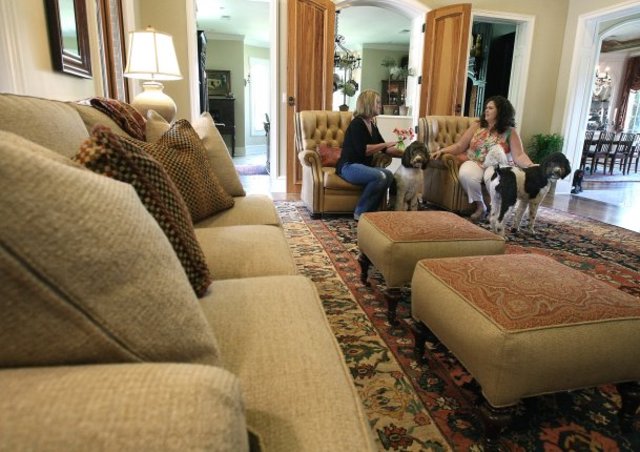Many buyers are looking for the made-in-America label when it comes to home decor

Author: Stacy Wiedower
Publisher: Commercial Appeal
8/24/2012
When Rita Christian was a little girl, her father was such a proponent of American-made products that she remembers him checking labels on items before he bought them. Her dad was the product of a different era, but the more Christian thinks about it, the more she thinks he had the right idea.
"With the economy the way it is, we've got to get back to that," she said.
That's why Christian is part of a growing number of American consumers seeking out furniture and home products made exclusively in the United States. Christian and her husband, Chip, worked with interior designer Stacy McSpadden of Chestnut Hall Furniture & Interiors to find American-made items to furnish their Olive Branch home.
"All the pieces in their master bedroom were made in America," McSpadden said. "In the living room, they have a lot of antiques, but all of the upholstery in the room was made in America."
Ami Austin, owner of Ami Austin Interior Design, also has worked with clients who prefer pieces that are American made. In one estate-size home, she's filled the spaces wall-to-wall with American upholstery and case goods.
She prefers U.S.-made products for reasons different from those of her clients.
"There's such an ease in talking to these businesses, and in most cases they're family-owned businesses, so you get to have a real relationship with the people during the manufacturing and specification process," Austin said. "If I want to pick up the phone and call and say, 'Is this ready to ship?,' I'm talking to a friendly voice. I don't have something in a crate sitting in a port trying to get OK'd to get into the U.S. To me, this is a beautiful thing."
Chestnut Hall owner Michael Baty has included in his store a "Made in America room," a space filled entirely with U.S.-made case goods and upholstery. He said his shop has worked to cultivate relationships with American furniture-makers in part because he's seen growing demand for U.S.-made items, but also because he thinks it's the right thing to do.
"Given what's happening with the economy, if we can provide things that are made in America that are good for this country, that seems to be the minimum of what we can do as Americans," he said. "We're not asking clients to buy things at a lesser quality and yet pay more. What we're doing is sourcing out furniture made in America at a very good price, and the quality is as good, or usually better, than what you can get in an imported piece. It's a win-win situation for everybody."
Historically speaking, Baty said, U.S.-made new furnishings tended to be higher in quality than new imported pieces. Over the past two decades, though, that trend began to change — not because the quality of American-made furniture declined, but because the quality of foreign-made furniture improved.
Coupled with the often-significant savings associated with offshore manufacturing, he said, the shift caused many American furniture-makers to choose to move their production facilities abroad. Others followed suit to compete.
Now, though, Baty sees the tide shifting once again.
"The valuation of the yuan in relation to the dollar and also the price of oil and inflation has made the cost of manufacturing things, particularly in China, as expensive when you add in all the costs that go with it as making it here," he said. "Plus, it's a lot harder to manage that process from far away."
Ron Fowler, an independent manufacturers' representative who has worked in the furniture business for 36 years, agreed that price increases and other issues with offshore manufacturing are causing U.S. furniture makers to take a new look at their own land.
"I represent one line that's made in Egypt, and with the instability there, they've decided to come back to the U.S.," Fowler said. "Their furniture is going to be made in Ohio."
Interior designer Valerie Woodend, co-owner of Germantown-based Fresh Perspective, said a trend she sees among her shop's clients is to buy not just furniture, but also art and accessories that are American-made.
"I see a huge trend with supporting local artisans and small, local businesses," Woodend said. "Even more so than furniture, a lot of our clients are wanting local art, local pottery, any kind of home décor item that really adds the personalized touch to their homes. We're always seeking local artists whose work we can include in our store. There is such a strong demand for it."
For the Christians, their desire to buy American-made products goes deeper than supporting the local economy. It goes deeper, even, than pride in their homeland.
"My husband and I are both very patriotic people," Christian said. "We have several generations of family members that have served in the armed services, and we've even lost family members in the armed services."
In her view, Christian said, buying U.S.-made furniture and products is a way to support the nation's economy in a time of crisis.
"We're now in an economic war for survival," she said. "Internally, we've escalated the debt crisis, and externally, we have other nations, particularly China, that threaten to take us over financially without even firing a shot. Our ancestors allowed us the freedom we have, and now I feel like we're almost letting it go. We just want to do our part."